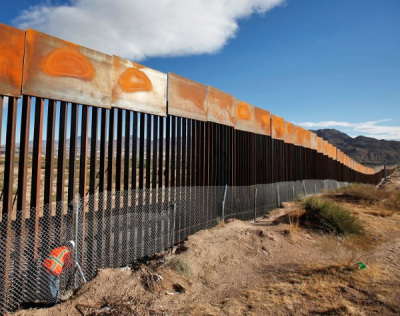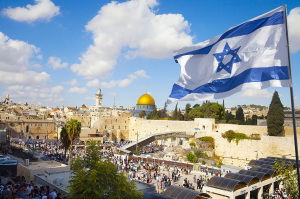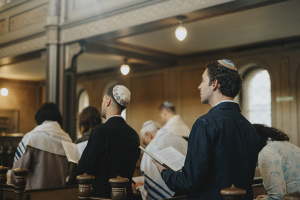Haitian migrants success story inspires plans on Mexican side of border

Today, while migrants continue to caravan from Central America and arrive at the US border with Mexico, their stories often painted in various shades of gloom, a different kind of picture emerged in Tijuana a couple of years ago.
As someone who lives and works in ministry on the border between San Diego and Tijuana, I’ve witnessed a “caravan” success story while working with the Haitian migrants who arrived to the same spot two years ago.
At that time, some 15,000 Haitian migrants who had moved to Brazil in search of work traveled north, mostly by land, winding up at the American border crossings that lead to Southern California. Some of those migrants were allowed to enter the US, however, another 5,000 decided to stay on the Mexican side in Baja, making Tijuana home.
It now seems like a distant memory that the Haitians moved out of the temporary refugee shelters relatively quickly to live in their own houses. Ask many residents or careful observers in Baja about the Haitians now living in Tijuana and you’ll find that there is a general consensus that they have achieved full integration into everyday living and enjoy gainful activities, whether working in stores or factories, or managing their own small businesses.
The Haitian success story in Baja includes not only a people group holding the exterior trappings of a place to live and work, but more importantly, the blessing of a spiritual home. With the help of local pastors and ministry leaders, church doors were opened to their own Haitian congregations in Tijuana.
There are more than four prominent Haitian churches or groups in the area with many more smaller groups and fellowships. The largest church has nearly 200 members and is still growing. Last December, this very same congregation along with others had a joint crusade event for three evenings in the First Baptist Church located in downtown Tijuana. Everyone was invited, including believers and non-believers, and Mexican-born neighbors of all socio-economic backgrounds. During the conclusion of the outreach, the Haitians celebrated the “harvest” by hosting a dinner of abundant Haitian delicacies as well as an amazing gift-exchange.
That celebration again confirmed our observations that Baja had become a second home for the Haitian migrants. Initially, the phenomenon was inconceivable for everyone on both sides of the border: Haitian refugees and local Baja people coexisting.
However, Christians within Mexico helped "build a church" instead of partaking solely in humanitarian efforts.
How did the Haitians transform from refugees who wandered for five long years through various South American countries after a tragic earthquake devastated their country to productive citizens of Baja?
Besides being a resourceful lot, a number of them sought God for help.
Each Sunday morning the Haitians attend a worship service in their own church. On Thursday evenings, there’s a prayer service. Their prayers are ones of gratitude and prayers to be used by God.
In March, ten or more pastors and leaders of the First Baptist Church/Haitian Congregation in downtown Tijuana are starting a 3-year, evening classes program at Gloria Seminary, also in Tijuana, where students will be ordained as ministers upon graduating.
Can you see how God’s preparation for this part of Mexico is being played out? Maybe it’s part of God’s plan for Haitians to be evangelizing Mexicans.
"As the heavens are higher than the earth, so are my ways higher than your ways and my thoughts than your thoughts ( NIV - Isaiah 55:9).
God’s ways are eternally and immensely higher than ours and His plan for the Central American migrants, while concealed to us now, will be revealed in His timing.
Earlier this month, a group of local pastors who were joined by American and Korean pastors and ministry workers, held a roundtable discussion in the tiny town of La Mision in Baja, one hour south of Tijuana. The 15 of us prayed for God’s will and guidance and at the end of two days of meetings, a plan of action was created: let’s use whatever resources God has and will provide and help the Central Americans plant their own churches. Our goal is to have churches planted before July (2019).
This Saturday (1/26/19), we will be holding a prayer and strategies meeting at El Chaparral Border Church http://elchaparralchurch.weebly.com/ located only steps from the border. At this first public meeting, we plan to actively search for interested leaders among the migrants. We want people that come from the Central American migrant community in Tijuana to be their own leaders.
Within a 6-month period, our initiative should be one that is owned by the migrants themselves. We will continue to provide mentorship and intercessory prayer.
Very soon, we’d like to see our first Christian Central American leader.
Retired from life-long career as a CPA in New York and San Diego, Stan JH Lee works in full-time ministry as founder of RtC (Relevant to Cross) Ministries https://www.facebook.com/Relevant2Cross/ in Baja Mexico. RtC is engaged in urban ministry serving the homeless, deportees and refugees. Lee often collaborates with other like-minded ministries from both sides of the border. His most recent ministry project is helping migrants from Central America to plant their own churches in Baja.




























